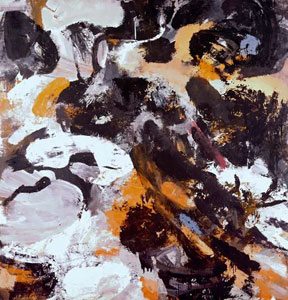Abstract expressionism (nonfiction): Difference between revisions
Jump to navigation
Jump to search
(Created page with "'''Abstract expressionism''' is a post–World War II art movement in American painting, developed in New York in the 1940s. Not to be confused with Abstract art. == Des...") |
No edit summary |
||
| Line 1: | Line 1: | ||
'''Abstract expressionism''' is a post–World War II art movement in American painting, developed in New York in the 1940s. | [[File:Boon_James_Brooks_1957.jpg|thumb|''Boon'' by James Brooks.]]'''Abstract expressionism''' is a post–World War II art movement in American painting, developed in New York in the 1940s. | ||
Not to be confused with [[Abstract art]]. | Not to be confused with [[Abstract art]]. | ||
Revision as of 07:33, 30 May 2016
Abstract expressionism is a post–World War II art movement in American painting, developed in New York in the 1940s.
Not to be confused with Abstract art.
Description
It was the first specifically American movement to achieve international influence and put New York City at the center of the western art world, a role formerly filled by Paris.
Although the term abstract expressionism was first applied to American art in 1946 by the art critic Robert Coates, it had been first used in Germany in 1919 in the magazine Der Sturm, regarding German Expressionism.
In the United States, Alfred Barr (nonfiction) was the first to use this term in 1929 in relation to works by Wassily Kandinsky (nonfiction).
Nonfiction cross-reference
External links
- Abstract expressionism @ wiki.karljones.com
- Abstract expressionism @ Wikipedia
